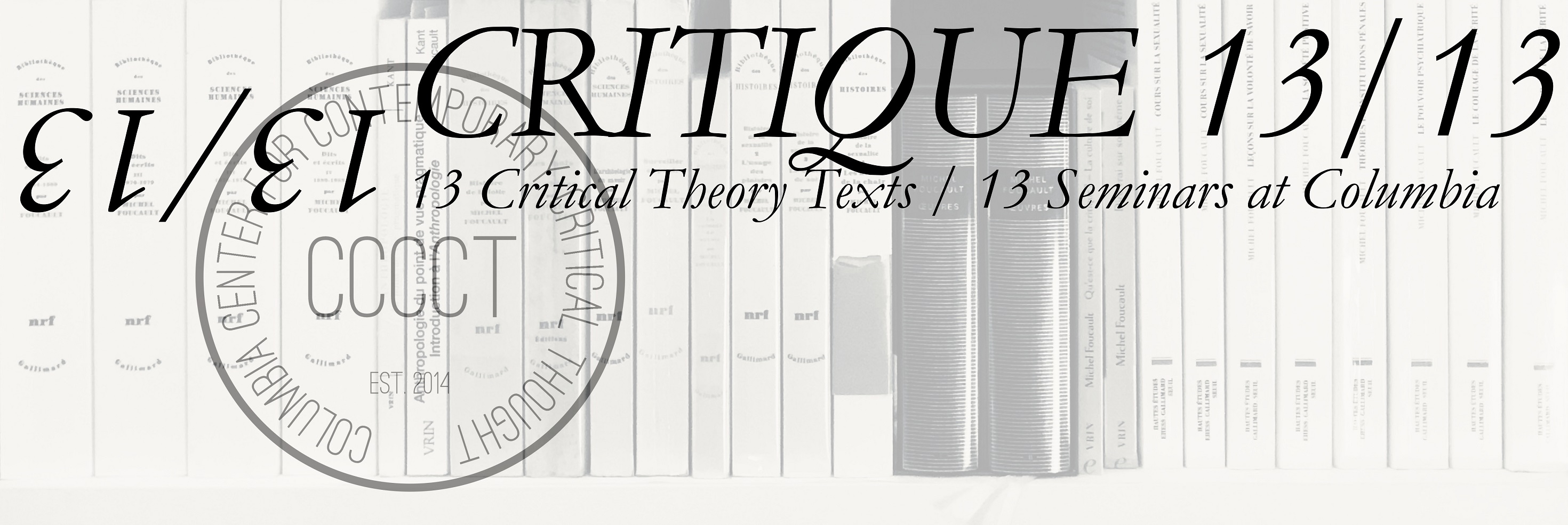By Bernard E. Harcourt
In the intense conversation at Critique 7/13 on Adorno’s Negative Dialectics, the discussion returned, again and again, to the question of “productivity”: Is it possible to speak of the productivity of Adorno’s method given that it privileges the negative moment of the dialectic? Martin Saar repeatedly resisted any talk of productivity, stressing instead the uniquely dark streak of what he called “the extreme negativity” of Adorno’s philosophical approach. By contrast, I highlighted the productive work that the method of negative dialectics does, in part to avoid collapsing the negativity into nihilism. Without suggesting that critique should be constructive or propose readily-available alternatives—and without myself embracing Adorno’s dialectic—I argued that the negative dialectic, on Adorno’s interpretation, contributes to what he called a “transformative praxis” and is less resigned to the present than more “activist” philosophical approaches (again, at least on Adorno’s view).[1] As a result, I found myself, oddly, rehabilitating Adorno’s approach—despite the fact that I do not share many of the sensibilities that Adorno expressed in his writings, especially his penchant for such philosophical removal and his hostility or animosity toward young activists who feel they can no longer tolerate the intolerable.
I understand Martin Saar’s insistence, and his resistance. I understand his desire to avoid, in every possible way, softening Adorno’s negative dialectic and turning it into milk toast. It would surely do violence to Adorno’s writings to suggest that he was trying to be constructive, or positive, or productive. In that sense, Saar’s interpretation is a corrective against anyone bending Adorno back into the fold. But it is important, I believe, not to allow the extremity of negativity to veer into a form of nihilism that ultimately eschews any and all praxis; and in that sense, I too am offering a corrective reading of Adorno to warn against those passages—especially in 1968 and 1969—where Adorno almost sounds as if he is opposed to all action, not just action for actions sake or actionism.
Adorno’s negative dialectic, I would argue, fits precisely in the narrow space between negativity (as a corrective to German Idealism, as well as to later generations of the Frankfurt School) and nihilism (as an entire abandonment of the action imperative). As such, Adorno’s thought serves as an ongoing barricade against the slide of Frankfurt critical theory back to Kant or Hegel—in other words, back to a too-rosy picture of reason and progress. It is important, in this sense, to emphasize the situated nature of Adorno’s intervention: the extremeness of the negativity must be understood as a virulent reaction against the Hegelian dialectic and its faith in a step-wise progress. For Adorno, there is no expectation of a positive outcome or resolution—and in that sense, I agree with Saar. But there is a conviction that the negative dialectic is the right path forward for philosophy and that it actually achieves something more than more rosy eyed approaches.
Adorno’s negative dialectic serves as an internal voice of skepticism within the Frankfurt School, a home-grown, authentic, and in that sense, fully legitimate voice, internal to the Frankfurt discourse, that puts a break on the “necessity” of an overcoming or reconciliation. Adorno resists any logical movement out of our crises, and finds solace only, by contrast, in a continuing confrontation and struggle with reality. This is where Adorno comes close to post-structuralists, such as Foucault or Deleuze, or deconstructionists like Derrida. It is in highlighting the gaps and ambiguities, the remainders, that make it impossible to resolve or to expect an immanent way forward.
For those of us who do not necessarily believe that history is on a progressive trajectory and do not have faith in the necessary success of any philosophical method, we are, I take it, stuck in a space like the one described by Adorno, of perpetual tension and confrontation, or, like the one described by Foucault, of inevitable contestation over knowledge-power. For those of us there, there is no escaping the conflict. That is what Saar calls extreme negativity—I agree. But I would add that, in being stuck there, doomed to continue to struggle to understand the world and to act, we are doing productive work. We avoid the false hope and deception of illusory ways out. This does not render us passive. We act, knowing that what we do is not guided or ensured by critical theory, but can only confront and be confronted by theory—and we revise our actions. And we rethink. And we act. Saar is surely right to reject any notion of functionalism or instrumentality: it cannot be that we embrace the extreme negativity merely as a function of instrumental reason. No, we do not embrace Adorno’s method to better master our present. We do so—or a close kin methodology—because there is no other choice. There is no other way to avoid on the one hand the darkness of nihilism that would render us complacent and resigned, and on the other hand, the milk toast of constructiveness and inherent step-wise progress that would foolishly lead us to slaughter. In the end, Adorno is extremely important as an internal backstop within the Frankfurt School against a slide either way. In this, Adorno’s negative dialectic plays a pivotal role still today.
